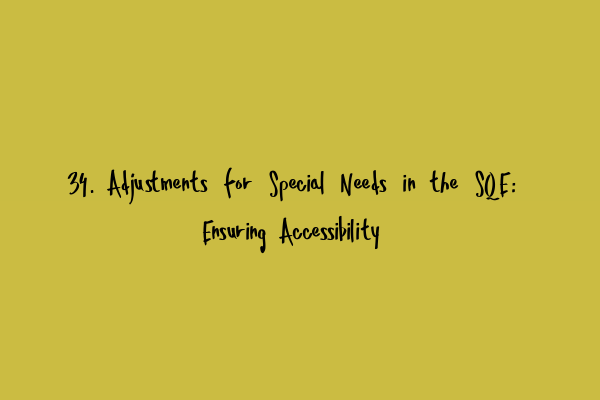34. Adjustments for Special Needs in the SQE: Ensuring Accessibility
Welcome to SQE Exam Law, your ultimate resource for all things related to the Solicitors Qualifying Examination (SQE). In this article, we will be discussing the importance of making adjustments for special needs in the SQE to ensure accessibility for all candidates.
As a leading provider of SQE training and preparation materials, we understand the need for inclusivity and accommodation in the legal profession. The SQE exam is designed to assess the competence of aspiring solicitors, but it is crucial that it does not create unnecessary barriers for candidates with disabilities or special needs.
With that in mind, let’s explore some key considerations and adjustments that can be made to ensure the SQE remains accessible to all candidates:
1. Accommodating Physical Disabilities
Candidates with physical disabilities may require additional support or reasonable adjustments during the SQE exam. This can include access to assistive devices, modified exam formats, or additional time to complete the exam. These adjustments aim to create a level playing field and ensure that candidates with physical disabilities have an equal opportunity to demonstrate their knowledge and skills.
For more information on the specific accommodations available for candidates with physical disabilities, please refer to the SQE Strategies: Proven Tactics to Ace the Solicitors Qualifying Examination article on our website.
2. Supporting Candidates with Learning Disabilities
Individuals with learning disabilities may require adjustments to the exam format or additional support to effectively demonstrate their knowledge and skills. This can include extra time, alternative exam formats, or the provision of assistive technology. It is crucial to offer these accommodations to support candidates with learning disabilities and ensure a fair evaluation of their abilities.
Want to learn more about how to apply your legal knowledge in real-life scenarios? Check out our comprehensive guide on SQE Case Studies: Applying Knowledge in Real-Life Scenarios.
3. Ensuring Visual Accessibility
Visual accessibility is a key consideration in making the SQE exam accessible. Candidates who are visually impaired or have other visual impairments may require adjustments such as enlarged fonts, screen reader compatibility, or the provision of accessible exam materials. These accommodations aim to ensure that all candidates can clearly read and understand the exam questions and materials.
If you are looking for strategies to plan and execute your SQE exam for optimal performance, our article on SQE Exam Strategy: Planning and Executing for Optimal Performance is a must-read.
4. Assisting Candidates with Neurodiverse Conditions
Neurodiverse conditions such as autism, ADHD, or dyslexia can pose unique challenges for candidates in the SQE exam. To ensure accessibility, adjustments can be made, such as providing additional time, allowing the use of assistive technology, or offering alternative exam formats. These accommodations aim to enable candidates with neurodiverse conditions to showcase their abilities and overcome any barriers they may face.
Curious about how the SQE can open doors to legal practice? Read our comprehensive guide on the Solicitors Qualifying Examination (SQE): Your Gateway to Legal Practice.
5. Promoting Mental Health and Well-being
The SQE preparation and exam process can be stressful for all candidates. However, it is crucial to acknowledge that some candidates may require additional support to manage their mental health and well-being. Providing access to counseling services, additional breaks during the exam, or flexibility in exam scheduling can help promote a supportive environment for all candidates.
Time management is a crucial skill when it comes to SQE exam success. Learn valuable strategies for efficient exam completion in our article on Mastering Time Management in SQE: Strategies for Efficient Exam Completion.
Conclusion
Ensuring accessibility in the SQE is not only a legal obligation but also a moral imperative. By making adjustments for special needs, we can create a fair and inclusive exam process that allows all candidates to showcase their knowledge and skills.
At SQE Exam Law, we are committed to promoting accessibility and inclusivity in the legal profession. If you require any further information or support regarding adjustments for special needs in the SQE, please do not hesitate to contact us. We are here to help you succeed.
